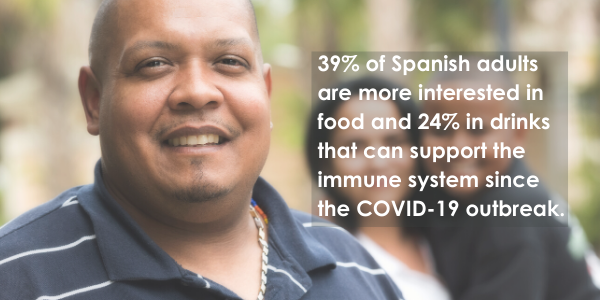What’s Behind the Evolving Demand for Immune Health in Europe?

Interest in Immune health is on the rise, especially in light of the global pandemic. Yet this demand for immune health is not new – it is very much a case of evolution rather than revolution. In recent years consumers have made the switch from reactively to proactively approaching their health and wellness by seeking products with added functionality and clinically demonstrated health benefits.
It’s important to note that consumers haven’t changed their perspectives toward immune health on a whim. In fact, increasing demand is rooted in foundations that long precede the crisis. Among these fundamental drivers of demand is the pursuit of wellness benefits offered by research supported immune health ingredients.
Strong demand across regions.
In 2019, just prior to the outbreak of the pandemic, Kerry conducted consumer research showing that demand for immune health products was high within Europe. In Italy, for example, 39% of respondents said they had used an immune health product in the previous six months and a further 33% would consider doing so in the future.
In Europe’s dietary supplement market, immune health replaced health and wellness as the leading market driver in 2018. Immune health has accounted for the largest segment of this market ever since, accounting for 27% of launches in 2019, up from 23%.
Download the white paper for future-proof formulation opportunities that can help meet the demand for immune health products.
The emergence of popular formats.
While traditional supplements continue to dominate immune health markets, functional food and beverage products have emerged as an increasingly popular format. In France, for example, recent reports show evidence of new consumer behavior as a result of during the lockdown, including a growing demand for functional foods. Specifically, 1 in 3 (34%) French consumers say they have been consuming functional food and beverages known to be beneficial for the immune system. As well, 39% of Spanish adults are more interested in food and 24% in drinks that can support the immune system since the COVID-19 outbreak.
Despite this growing demand, immune-related claims for food and beverages within Europe are still considered to be somewhat ‘niche’, due to strict regulations. In the two years up to March 2020, within all of Europe, less than 1% of food and drink launches in France have had an immune health claim. It is increasingly evident that there is opportunity for growth and potential for brands to flourish in this space.
What are consumers looking for?
So, what do consumers look for in immune health products? Kerry’s recent consumer research revealed the importance of science-backed immune-health ingredients and products, which demonstrate safety and efficacy.
Globally, 39% of the consumers we surveyed said seeing claims based on research or scientific data would make them more likely to buy a healthy lifestyle product, with this figure slightly higher in some European countries such as Italy (41%) and Spain (40%). Transparency was also a key factor: almost half (45%) of consumers in Spain said they wanted to see the benefits of a healthy lifestyle product explained on its packaging.
What’s happening in Europe’s immune health markets can be described as an evolution. While the pandemic makes it more important than ever that companies act responsibly and demonstrate a commitment to safety, efficacy and scientific research, consumers’ requirements have not changed. They want trust, transparency and scientific substantiation.
Wellmune®, a l food, beverage and supplement ingredient, is built the way it is because it works, and because it meets consumers’ demands for transparency with research supported immune health benefits. Wellmune is the only yeast beta glucan backed by over a dozen published, peer-reviewed clinical studies, and has regulatory approval in major markets, including novel food approval in Europe.
Sources:
Kerry, Global Consumer Survey – Digestive & Immune Health, 2019
Innova Market Insights ‘Supplements in Europe 2019’
Mintel ‘In ‘locked-down’ France, new habits are forming’, 2020
Mintel ‘How COVID-19 accelerated the 2030 Food & Drink Trends’, 2020
Mintel, ‘COVID-19 will radically change specialised nutrition’, UK 2020
Nyangale, E et al. ‘Bacillus coagulans GBI-30, 6086 Modulates Faecalibacterium prausnitzii in Older Men and Women’ The Journal of Nutrition, Volume 145, Issue 7, July 2015, Pages 1446–1452


